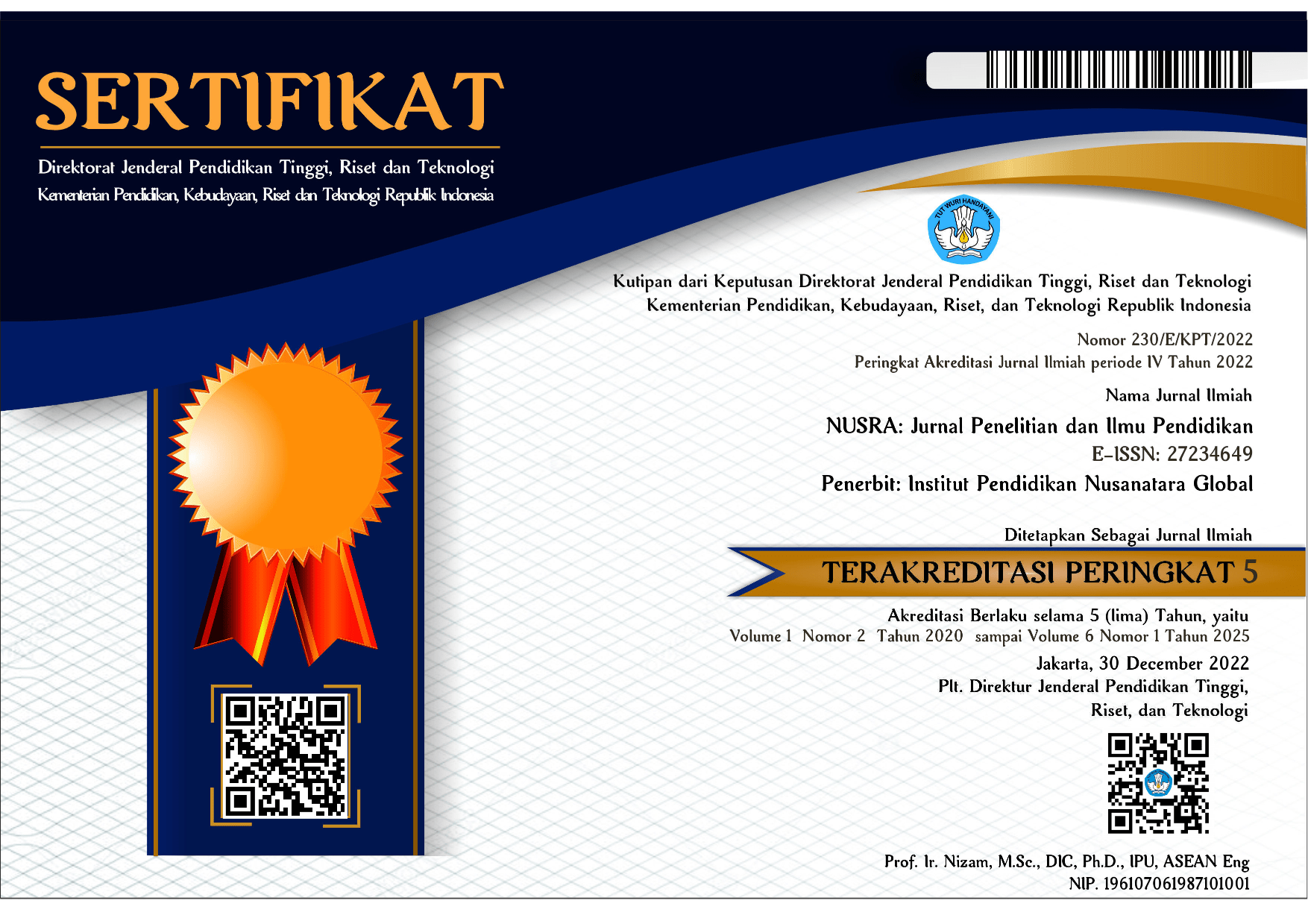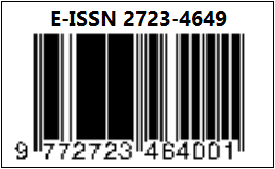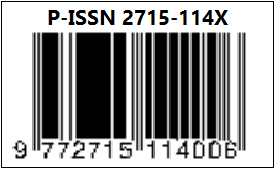Ruang Lingkup Pendidikan: Pengaplikasian Maqasid Syariah Kajian dalam Fikih pada Siswa di SMAN 1 Purwokerto
DOI:
https://doi.org/10.55681/nusra.v5i3.2944Keywords:
Students, Education, Application Of Maqasid Sharia, Fiqh StudiesAbstract
Education is the main foundation in the formation of individuals with quality and integrity in society. One approach that can be applied is the application of Maqasid Syariah in the study of jurisprudence for students at SMAN 1 Purwokerto.This article discusses the application of Maqasid Syariah in fiqh and utilizes the concept of maqasid sharia. Maqasid Syariah is an approach that emphasizes the core or substance of Islamic law, therefore maqasid sharia more clearly identifies Islam. In the context of fiqh, the clearer application of the maqasid sharia method will open up a broader and deeper interpretation of Islamic law.This research aims to explore the scope of application of Maqasid Syariah in fiqh learning in senior high schools. The research method used is descriptive analysis with a qualitative approach, involving literature study and interviews with teachers and students. The research results show that the application of Maqasid Syariah in fiqh learning at SMAN 1 Purwokerto has a positive impact on the formation of students' character and their understanding of Islamic teachings. The implication of this research is the need to develop a curriculum that integrates Maqasid Syariah principles as part of Islamic education in schools to support the formation of a generation that is responsible and has noble character in society. This article discusses in detail the concept of Maqasid Sharia, and describes its application in several areas of fiqh such as muamalah, worship, and muamalat. Through this analysis, this article provides an overview of the importance of understanding and implementing maqasid sharia in facing changing times and the complexity of contemporary problems in Muslim society.
Downloads
References
Abdul Helim. (2017). BELAJAR ADMINISTRASI MELALUI AL-QURAN: Eksistensi Pencatatan Akad Nikah (Cetakan Pertama). K-Media.
Abdul Helim. (2019). MAQASID AL-SHARI’AH versus USUL AL-FIQH (Konsep dan Posisinya dalam Metodologi Hukum Islam (Cetakan Pertama). PUSTAKA PELAJAR.
Abu Yazid Adnan Quthny, Ahmad Muzakki, & Zainuddin. (2022). Pencatatan Pernikahan Perspektif Hukum Islam dan Undang-Undang Nomor 1 Tahun 1974. Asy-Syari’ah : Jurnal Hukum Islam, 8(1), 25–40.
Arif, K. M. (2020). PENGARUH MAQASHID SYARIAH TERHADAP FIQH MUAMALAH DAN FATWA DALAM MEWUJUDKAN MODERASI ISLAM. El-Arbah: Jurnal Ekonomi, Bisnis Dan Perbankan Syariah, 4(01), 1–16.
Busyro. (2019). MAQASID AL-SYARIAH (Pengetahuan Mendasar Memahami Maslahah) (Cetakan Pertama). KENCANA.
Chapra, M. U. (2000). The future of economics: An Islamic perspective. Islamic Foundation.
Desi Susilawati. (2024). PENGANTAR ILMU PENDIDIKAN (Cetakan Pertama). WIDINA MEDIA UTAMA.
Dusuki, A. W., & Bouheraoua, S. (2011). THE FRAMEWORK OF MAQĀS.ID AL-SHARĪʿAH AND ITS IMPLICATION FOR ISLAMIC FINANCE. Islam and Civilisational Renewal.
Jamali, L. L., Zain, L., & Hasyim, A. F. (2016). Hikmah Walimah Al-‘Ursy (Pesta Pernikahan). Diya Al-Afkar, IV(2), 165.
Kamali, M. H. (2010). Shari’ah law: An introduction (Reprinted). Oneworld Publ.
M Alvin Nuzi Khairi Mazin. (2022). Analisis Implementasi Pencatatan Perkawinan menurut Peraturan Menteri Agama dan Hukum Islam. Jurnal Riset Hukum Keluarga Islam, 105–110.
Ma’sum, H. E. A. (2013). PERNIKAHAN YANG TIDAK DICATATKAN DAN PROBLEMATIKANYA. Musãwa Jurnal Studi Gender dan Islam, 12(2), 201.
Misbahuddin. (2013). USHUL FIQH 1 (Cetakan Pertama). Alaudin University Press.
Muhammad Al-Tahir Ibn ashur. (2013). Ibn Ashur – quite courageously – also addressed the sensitive topic of the intents/Maq¥|id of Prophet Muhammad (ßAAS)*behind his actions and decisions. He introduced criteria to differentiate between the Prophetic traditions that were meant to be part of the Islamic law and the Prophetic actions/ sayings that were meant to be for the sake of specific purposes such as political leadership, court judgment, friendly advice, conflict resolution, etc. But Ibn Ashur’s most significant contribution in this book has been the development of new Maq¥|id by coining new (contemporary) terminology that were never formulated in traditional u|‰l al-fiqh. For example, Ibn Ashur developed the theory of the ‘preservation of lineage’ into ‘the preservation of the family system’, the ‘protection of true belief’ into ‘freedom of beliefs’, etc. He also introduced the concepts of ‘orderliness’, ‘natural disposition’, ‘freedom’, ‘rights’, ‘civility’, and ‘equality’ as Maq¥|id in their own right, and upon which the whole Islamic law is. Richmond, Surrey TW9 2UD, UK.
Musolli. (2018). MAQASID SYARIAH: KAJIAN TEORITIS DAN APLIKATIF PADA ISU-ISU KONTEMPORER. At Turas, V(I), 61.
Musyafah, A. A. (2020). PERKAWINAN DALAM PERSPEKTIF FILOSOFIS HUKUM ISLAM. CREPIDO, 2(2), 111–122.
Nuril Farida Maratus. (2020). Efektivitas Pencatatan Perkawinan Di Indonesia (Tinjauan Sosiologi Hukum). Khuluqiyya: Jurnal Kajian Hukum dan Studi Islam, 68–83.
Nyazee, I. A. K. (1994). Theories of Islamic law: The methodology of ijtihād. International Institute of Islamic Thought and Islamic Research Institute.
Romadloni, F. (2023). PENCATATAN PERKAWINAN DALAM PERSPEKTIF MAQASID SYARIAH. OPINIA DE JOURNAL, III(2).
Rusdaya Basri. (2019). USHUL FIQH 1 (Cetakan Pertama). IAIN PAREPARE NUSANTARA PRESS.
Sayyad, M. A. (2018). URGENSI PENCATATAN NIKAH SEBAGAI RUKUN NIKAH (STUDI KRITIS PEMIKIRAN SITI MUSDAH MULIA DAN KHOIRUDDIN NASUTION). 8(1).
Sutisna, Neneng hasanah, Arlinta Prasetian Dewi dkk. (2021). PANORAMA MAQASHID SYARIAH (Cetakan Pertama). CV. MEDIA SAINS INDONESIA.
Sya’bani, A. (2015). MAQASID AL-SYARI’AH SEBAGAI METODE IJTIHAD. Jurnal Online Kopertais Wilayah IV, 8(I), 1–16.
Wahyudi, Y. (2007). Is Islamic law secular?: A critical study of Ḥasan Ḥanafi’s legal philosophy (1st ed). Pesantren Nawesea Press.
Auda, Ǧāsir. (2008). Maqasid al-Shariah as philosophy of Islamic law: A systems approach (J. Auda, Ed.). The International Inst. of Islamic Thought.
Downloads
Published
How to Cite
Issue
Section
License
Copyright (c) 2024 Iing Ilham Karuniawan, Moh. Roqib

This work is licensed under a Creative Commons Attribution-ShareAlike 4.0 International License.














